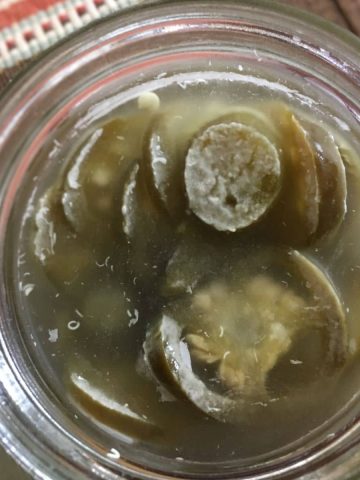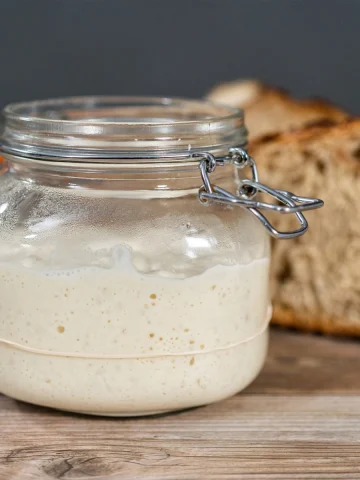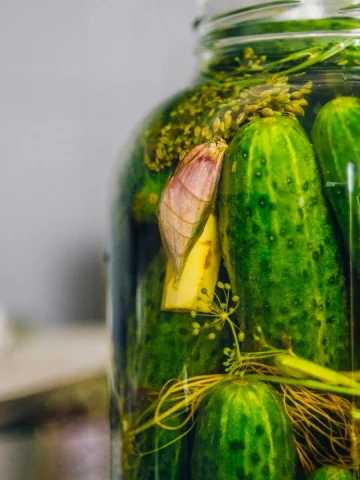How Much Sauerkraut Should I Eat Daily?
If you are wondering, "how much sauerkraut should I eat daily?" Consistency is more important than how much sauerkraut you eat daily. Eating an amount of sauerkraut that’s feasible for your lifestyle is best.
Probiotic foods are most beneficial when you eat them regularly, so pay attention to how often you eat them rather than worrying about how much you’re eating.
What Is The Best Time To Eat Sauerkraut?
Sauerkraut can be eaten anytime, but it is considered the best time to consume it is early in the morning.
If you are new to eating sauerkraut and fermented foods, you will want to start slowly to prevent common side effects of sauerkraut such as upset stomach, gas, diarrhea, and bloating.
Once your gut is comfortable eating sauerkraut, you can build up to more and more. I highly recommend making it a staple in your diet.
Raw sauerkraut will introduce billions of probiotics into the digestive system, which triggers a significant change in the gut microbiome, which can affect the absorption of water in the large intestine leading to diarrhea.
If you experience an upset stomach or diarrhea, then reduce the amount. Try as little as one teaspoon, eat it every other day, and work your way up.
What is Sauerkraut?
Sauerkraut starts as raw cabbage that is finely cut and fermented in salt brine for up to several months. During the fermentation stage, bacteria and yeast cells, which are naturally on organically grown cabbages, will begin breaking down the carbs in the shredded cabbages releasing lactic acid.
The fermented cabbage containing lactic acid created through the fermentation process is a sour flavor similar to kimchi without the spice. It’s one of the most common probiotic-rich foods, containing lactic acid, Tyramines, vitamins, and minerals.
Why Should I Eat Sauerkraut Daily?
Sauerkraut can aid in digestion and even help prevent constipation. Yes, you read that right, if you are not accustomed to eating sauerkraut, it can cause diarrhea, but when you are used to it, it can help prevent it.
The good bacteria created through fermentation allow your body to digest food more efficiently and enable your gut to absorb vitamins and minerals fully.
What about probiotic drinks such as kefir, beet kvass, and kombucha? They are also a great source of healthy gut bacteria. Again, start slowly and work your way up.
Due to the fermentation process, sauerkraut has many health and nutrition benefits that go above and beyond the benefits of fresh cabbage.
The Health Benefits of Sauerkraut
Strong Bones
Strong Immune System
Heart health
High source of Vitamin C
High source of Vitamin K
Reduces Stress
Promotes Healthy Skin
Lower Blood Pressure
Lower Cholesterol Levels
Sauerkraut provides a range of nutritional elements for optimal health. Low in calories and containing no fat, sauerkraut also features other benefits making it a decisive contribution to your diet, including:
Potassium
Copper
Vitamin B6
Magnesium
Iron
Vitamin K
Vitamin C
Sodium
Protein
High in Dietary Fiber
Probiotics are good bacteria that defend your body against harmful bacteria types and toxins. These healthy bacteria also communicate with your brain functions and have been proven to improve memory and reduce symptoms of anxiety and characteristics of depression.
Medically, sauerkraut is confirmed to have immune-boosting properties. Creating balance within your gut provides good gut lining, consistent with a healthy immune system, allowing the production of natural antibodies to keep your body safe and protected.
Including sauerkraut into your diet after a course of medication such as antibiotics can rebalance your gut and prevent stomach irritation. Small amounts of sauerkraut provide prevention and recovery elements to its benefits list, having been recommended to recover from illness as a probiotic-rich food.
Suppose you’re mindful about your diet or weight, sauerkraut’s low-calorie. In that case, high fiber makeup allows you to remain fuller for longer, providing the potential for you to reduce your daily calorie intake as a diet aid.
Suppose you’re mindful about your diet or weight loss, sauerkraut’s low-calorie. In that case, a high fiber diet helps you to feel fuller for longer, providing the potential for you to reduce your daily calorie intake as a diet aid.
Incorporating sauerkraut into your diet is only advisable as an addition to your eating plan instead of a replacement. Please discuss any diet or lifestyle changes with your doctor and seek nutritional advice before making diet changes.
How to Shop for the Healthiest Brands of Sauerkraut
The very best sauerkraut you can eat is homemade sauerkraut. However, that’s not always a possibility with our busy lives.
There are many brands of sauerkraut available in the supermarket today. Avoid pasteurized sauerkraut, preservatives, and any sauerkraut, including sugars where possible.
Sauerkraut should be as simple as possible, only containing cabbage and salt. At the same time, some varieties add other herbs, spices, and vegetables to avoid adding additional sugar to the jar.
If you’re looking for probiotic benefits from sauerkraut, be mindful of store-bought brands, as they may contain lower probiotic counts compared to fresh, unpasteurized sauerkraut.
Always look for refrigerated sauerkraut. Look for labels containing the words raw, live, or probiotics. There should be no sugar or vinegar in the ingredients list.
Buying sauerkraut in a tin or jar will involve it mixed with vinegar and pasteurized at a very high temperature leaving it without live probiotic cultures. Therefore, excluding the fantastic benefits fresh sauerkraut has to offer. Overall, the ingredients for the best sauerkraut and nice and simple.
Learn more here: Does store-bought sauerkraut have probiotics, and is all sauerkraut fermented?
Can You Eat Too Much Sauerkraut?
Your body will tell you when you’ve eaten too much sauerkraut. Eating excessive amounts of fermented food can lead to flatulence, diarrhea, and bloating due to the small intestine being unable to break it down. While it might be uncomfortable in the short term, it has no long-term effects on you or your body.
Sauerkraut has a high sodium content, so be mindful of the amount you include in your diet.
Foods With Probiotic Health Benefits
Other fermented foods such as probiotic yogurts and Kefir also provide opportunities to look after your gut health, similar to sauerkraut.
Some cheeses also provide probiotic benefits for gut health, easing the effects of irritable bowel syndrome, constipation, and bloating. Feta, Swiss, Gouda, and Edam cheese all have probiotics to help support your gut health and be incorporated into your diet.
Having probiotic foods like sauerkraut, yogurt, and Kefir within your diet will help reduce your risk of common infections such as UTIs, common colds, and flu. To experience the continued benefits, include probiotic health foods within your day-to-day diet.
Consuming a small amount daily will continue to balance both your body and your gut.
Sauerkraut, Fermented Food and Histamine Intolerances
Despite sauerkraut’s range of benefits to our health, it’s important to consider any medication you are taking and any intolerances you have. If you have an MAOI prescription (covering depression, anxiety, Parkinson’s disease, and OCD) or a prescription with a diet restriction list, sauerkraut should be avoided.
If in doubt, consult your medical professional.
Sauerkraut has a high content of tyramine and glucosinolates and a high concentration of histamine, a major cause of food intolerance. Those who suffer from hay fever may find sauerkraut might heighten their symptoms.
Salt Content in Sauerkraut
Sauerkraut is known to be high in salt. Therefore, if you want to avoid too much sodium, I recommend giving the sauerkraut a quick rinse before eating it. This will remove some of the salt and some beneficial probiotics, but not all of it.
And like always, it is best to consult your doctor before changing your diet.
Sauerkraut is gluten-free and vegan and contains all the health benefits we’ve explored today. Suppose you’re looking for similar fermentations to sauerkraut. Why not consider the sour cabbage from Romania, Brevard from northern Italy, or Curtido from El Salvador, of course. If you’re ever in Germany, try their sauerkraut, as sauerkraut is one of Germany’s national dishes!
If we’ve piqued your interest in healthy, nutritious sauerkraut, why not try it yourself? We recommend Bubbies Sauerkraut, Hamptons Brine, Farmhouse Culture Kraut, and Olive My Pickle. To taste the range of benefits eating sauerkraut daily has to offer.
We also have some further Sauerkraut information on Fermenters Kitchen, including the best sauerkraut to buy with probiotics and a simple sauerkraut recipe for you to try.






